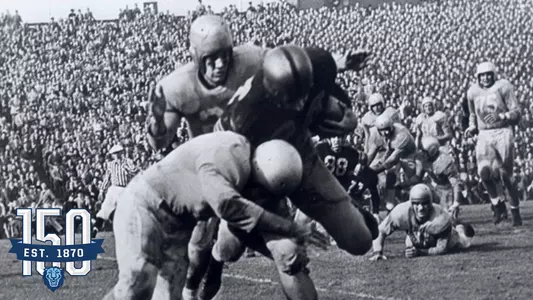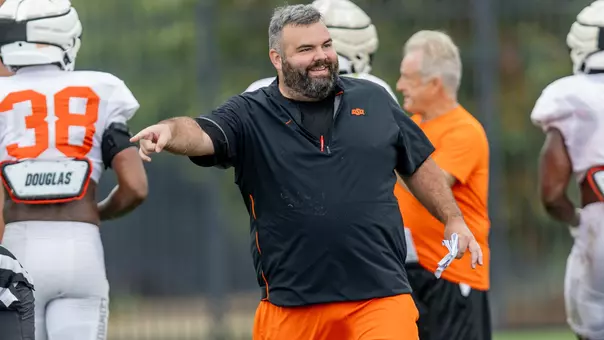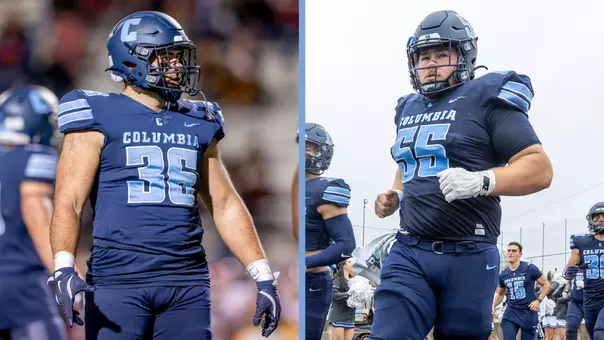
Great Football Wins: 1947 Upset Over Army
10/5/2020 3:00:00 PM | Football
Watch Full Columbia-Army GameTop-10 Biggest College Football Upsets of All-TimeCUFootball150 Feature PageVote for the Columbia Football All-150 TeamSubmit Your Favorite Columbia Football Memory or Moment
Columbia rallies from behind to upset heavily favored and No. 6 ranked Army 21-20; victory ends Army’s 32-game unbeaten streak.
NEW YORK—On October 25, 1947, Columbia halted Army's 32-game unbeaten streak in a dramatic 21-20 upset before a crowd of 35,000 packed into Baker Field's 32,000-seat wooden stadium. Among the dozens of journalists covering the game that day were two of sportswriting's immortals, Stanley Woodward and Red Smith of the New York Herald Tribune. This is the account of that game as related by those two giants of journalism in a rich prose style no longer seen in sportswriting. The comments in italics, linking the sportswriters' accounts, are those of Columbia historian Bill Steinman.
To set the scene: Columbia, with an excellent team that would finish 7-2, but coming off a 34-14 loss to Penn at Franklin Field; Army, perfect in 1944 and 1945, tied (0-0) by Notre Dame in 1946, and tied again by Illinois in 1947 – also a scoreless tie, for the 1947 Cadets had not allowed a point all season, outscoring their four opponents, 93 to 0. Would anybody ever beat Army? Would anybody ever gain that elusive victory which Red Smith called "the quarry which the entire American football pack harried for three years, 10 months and 29 days." It didn't start promisingly for the Lions.
Woodward: The first time Army got the ball it smashed to a touchdown in nine plays from its own 46 with Rip Rowan galloping 24 yards in one piece and Arnold Galiffa, the new T quarterback, firing a rocket pass and ultimately sneaking over. The line power and reckless drive of the Army backs made the game look one-sided at this point. Army barely missed a second TD after intercepting a pass on the Columbia two, but the Cadets scored again early in the second quarter on Bill Gustafson's 25-yard run to the one and Rowan's 1-yard plunge.
 Woodward: The first indication that Columbia considered itself anything more than a bystander came after the second touchdown … the Columbians traveled 69 yards for a touchdown without interruption. In this march was unveiled the passing combination of [Gene] Rossides to [Bill] Swiacki. The former threw three and the latter caught two of them, the second on the 6-yard line with Winfield Scott covering him as with a tarpaulin. Kusserow ran it over and the pattern of the game was revealed … Army was a running terror capable of 302 yards from scrimmage, which it did, and Columbia was a passing team capable of tapping the air routes for 263 yards, which it did. Furthermore, it gave a vague outline of the clutching ability of the lanky and loose-jointed [Bill] Swiacki. The Cadets scored their third touchdown just six seconds before the end of the half, taking over on their 20 after Columbia missed a field goal. On second down Rip Rowan went through left tackle and broke away.
Woodward: The first indication that Columbia considered itself anything more than a bystander came after the second touchdown … the Columbians traveled 69 yards for a touchdown without interruption. In this march was unveiled the passing combination of [Gene] Rossides to [Bill] Swiacki. The former threw three and the latter caught two of them, the second on the 6-yard line with Winfield Scott covering him as with a tarpaulin. Kusserow ran it over and the pattern of the game was revealed … Army was a running terror capable of 302 yards from scrimmage, which it did, and Columbia was a passing team capable of tapping the air routes for 263 yards, which it did. Furthermore, it gave a vague outline of the clutching ability of the lanky and loose-jointed [Bill] Swiacki. The Cadets scored their third touchdown just six seconds before the end of the half, taking over on their 20 after Columbia missed a field goal. On second down Rip Rowan went through left tackle and broke away.
Woodward: He faked one incipient tackler after another, tied Charley Klemovich into a bowknot with a cutback, and ran 84 yards for the touchdown. Jack Mackmull missed the extra point, but it didn't seem important at the time, for Army was in the lead, 20-7, and had been knocking holes in the Columbia line with savage abandon. The third quarter was devoid of both scoring and action. But the Lions seemed to become more sure of themselves and although the Army ground game continued to roll, they didn't allow the Cadets near the end zone.
Woodward: The Lions stopped each assault with a defense that was both inspired and bitter. And when the ball fell into the hands of the Columbians, they knew what to do with it. Early in the fourth quarter, Columbia's passing attack began to tell on the Cadets.

Smith: [Columbia used] a forward passing attack so versatile that it destroyed the Cadets' habitual poise. Early in the game, West Point rushed with a six-man line, hounding and harassing Rossides, ganging him so that he looked like New Year's Eve in Times Square. Even so, he contrived to throw accurately while in full flight, and Army decided to combat the passes at their destination rather than the point of origin. West Point ceased rushing, dropping the backers-up [linebackers] and a tackle to help cover the receivers. It didn't help. The Lions always had a halfback open on their right flank. Their short shots to crisscrossing ends were unstoppable. Early in the fourth quarter, Rossides started to hit. He fired to Bill Olson for two first downs, moving the Lions to the 28.
Woodward: From the Army 28, he heaved a colossal pass into the end zone. John Shelley apparently had Swiacki covered, but the latter made a headlong dive for the ball as it was about to hit the ground. In some unexplained manner he caught it, virtually off the ground. The Army players argued that he had trapped it, but it was ruled he caught it fairly, and that's the way it looked from the press box. Now up 20-14, the Cadets came back down the field to the Lion 34. They stalled there and were forced to punt. The center snap was high, however, and Rowan just managed to knock it down before he was tackled. Columbia took over on its own 39.
Smith: They rang in a hand-off from Rossides to Kusserow, who then leaped and fired a buck pass. And when Rossides took aim for a long one, nobody could cover Swiacki. As the Cadets fell back in panic, Rossides called upon a running game which had been helpless. He faked a pass and handed off to fullback Ventan Yablonski for 12 yards. Then he ran around left end for 15, setting up the famous pass reception.
Woodward: Then he fired the crucial pass of the game, almost inexplicably caught by Swiacki. The latter went down, looking over his right shoulder for the ball. At the last minute he took his eye off the ball, turned outward and made a full-length dive, catching the ball as if by magnetism. The ball was on the four. Rossides turned right end for two yards to the two. His next handoff went to Kusserow.
Smith: The legend of Army's invincibility … was concluded at 4:16 PM when Kusserow tunneled through left tackle and Ventan Yablonski converted the extra point that won for the Lions, 21 to 20. Kusserow … was scraped off the turf by Swiacki, the brawny Columbia end whose prehensile paws had made all the Lion scoring possible. Swiacki's mitts, which have a reach of approximately 12 feet in all directions, had sucked in Gene Rossides' forward passes like a vacuum sweeper.
Woodward: Swiacki leaped and plunged like a dervish and brought off the greatest line of impossible catches of the twentieth century.
Smith: Kusserow and Swiacki embraced in the end zone. They walked back to their positions arm in arm. From the Columbia stands came a gesture of derision stolen from the Cadet Corps, a taunting flutter of thousands of handkerchiefs. From the neat ranks of Army rooters came silence, thick as a $4 sirloin.
Smith: Six minutes and 37 seconds later the game ended. Down came the north goal posts. At the south end a single cop stood guard over the Columbia cordwood. He took one look at the clamoring horde bearing down on him, shrugged, and helped rip down the timbers. Coach Lou Little followed his players, who were bulling in double file through swarms of idolaters, bearing Swiacki supine upon their shoulders.
Woodward: Strangers embraced each other … Old Light Blues who came to weep remained not only to pray, but to swing exuberant and unnoticed left hooks at each other. In the clubhouse, Little burbled incoherently as his players hoisted him on their shoulders.

Smith: The players flung Little up on their shoulders. "Who owns New York?" they sang.
Interestingly, neither writer mentioned anything about the remaining 6:37. Rowan returned the ensuing kickoff to the 26 and almost broke away; the Cadets moved to a second down on the 38, but Kusserow intercepted Galiffa's pass at the Columbia 44 and returned it to the Army 44. Rossides ran for six and one yards, handed off to John Nork for eight and a crucial first down. The QB ran for six more and after the teams traded offside penalties, ran for two to the 21. He then carried the ball one yard to the 20 as the game ended.
(Note: The New York Herald-Tribune accounts are courtesy of Bob Barton, a 1957 Yale alumnus and long-time New Haven sportswriter.)
–Written and Compiled by Bill Steinman
Follow Columbia Football: TWITTER | FACEBOOK | INSTAGRAM
To set the scene: Columbia, with an excellent team that would finish 7-2, but coming off a 34-14 loss to Penn at Franklin Field; Army, perfect in 1944 and 1945, tied (0-0) by Notre Dame in 1946, and tied again by Illinois in 1947 – also a scoreless tie, for the 1947 Cadets had not allowed a point all season, outscoring their four opponents, 93 to 0. Would anybody ever beat Army? Would anybody ever gain that elusive victory which Red Smith called "the quarry which the entire American football pack harried for three years, 10 months and 29 days." It didn't start promisingly for the Lions.
Woodward: The first time Army got the ball it smashed to a touchdown in nine plays from its own 46 with Rip Rowan galloping 24 yards in one piece and Arnold Galiffa, the new T quarterback, firing a rocket pass and ultimately sneaking over. The line power and reckless drive of the Army backs made the game look one-sided at this point. Army barely missed a second TD after intercepting a pass on the Columbia two, but the Cadets scored again early in the second quarter on Bill Gustafson's 25-yard run to the one and Rowan's 1-yard plunge.
 Woodward: The first indication that Columbia considered itself anything more than a bystander came after the second touchdown … the Columbians traveled 69 yards for a touchdown without interruption. In this march was unveiled the passing combination of [Gene] Rossides to [Bill] Swiacki. The former threw three and the latter caught two of them, the second on the 6-yard line with Winfield Scott covering him as with a tarpaulin. Kusserow ran it over and the pattern of the game was revealed … Army was a running terror capable of 302 yards from scrimmage, which it did, and Columbia was a passing team capable of tapping the air routes for 263 yards, which it did. Furthermore, it gave a vague outline of the clutching ability of the lanky and loose-jointed [Bill] Swiacki. The Cadets scored their third touchdown just six seconds before the end of the half, taking over on their 20 after Columbia missed a field goal. On second down Rip Rowan went through left tackle and broke away.
Woodward: The first indication that Columbia considered itself anything more than a bystander came after the second touchdown … the Columbians traveled 69 yards for a touchdown without interruption. In this march was unveiled the passing combination of [Gene] Rossides to [Bill] Swiacki. The former threw three and the latter caught two of them, the second on the 6-yard line with Winfield Scott covering him as with a tarpaulin. Kusserow ran it over and the pattern of the game was revealed … Army was a running terror capable of 302 yards from scrimmage, which it did, and Columbia was a passing team capable of tapping the air routes for 263 yards, which it did. Furthermore, it gave a vague outline of the clutching ability of the lanky and loose-jointed [Bill] Swiacki. The Cadets scored their third touchdown just six seconds before the end of the half, taking over on their 20 after Columbia missed a field goal. On second down Rip Rowan went through left tackle and broke away.Woodward: He faked one incipient tackler after another, tied Charley Klemovich into a bowknot with a cutback, and ran 84 yards for the touchdown. Jack Mackmull missed the extra point, but it didn't seem important at the time, for Army was in the lead, 20-7, and had been knocking holes in the Columbia line with savage abandon. The third quarter was devoid of both scoring and action. But the Lions seemed to become more sure of themselves and although the Army ground game continued to roll, they didn't allow the Cadets near the end zone.
Woodward: The Lions stopped each assault with a defense that was both inspired and bitter. And when the ball fell into the hands of the Columbians, they knew what to do with it. Early in the fourth quarter, Columbia's passing attack began to tell on the Cadets.

Smith: [Columbia used] a forward passing attack so versatile that it destroyed the Cadets' habitual poise. Early in the game, West Point rushed with a six-man line, hounding and harassing Rossides, ganging him so that he looked like New Year's Eve in Times Square. Even so, he contrived to throw accurately while in full flight, and Army decided to combat the passes at their destination rather than the point of origin. West Point ceased rushing, dropping the backers-up [linebackers] and a tackle to help cover the receivers. It didn't help. The Lions always had a halfback open on their right flank. Their short shots to crisscrossing ends were unstoppable. Early in the fourth quarter, Rossides started to hit. He fired to Bill Olson for two first downs, moving the Lions to the 28.
Woodward: From the Army 28, he heaved a colossal pass into the end zone. John Shelley apparently had Swiacki covered, but the latter made a headlong dive for the ball as it was about to hit the ground. In some unexplained manner he caught it, virtually off the ground. The Army players argued that he had trapped it, but it was ruled he caught it fairly, and that's the way it looked from the press box. Now up 20-14, the Cadets came back down the field to the Lion 34. They stalled there and were forced to punt. The center snap was high, however, and Rowan just managed to knock it down before he was tackled. Columbia took over on its own 39.
Smith: They rang in a hand-off from Rossides to Kusserow, who then leaped and fired a buck pass. And when Rossides took aim for a long one, nobody could cover Swiacki. As the Cadets fell back in panic, Rossides called upon a running game which had been helpless. He faked a pass and handed off to fullback Ventan Yablonski for 12 yards. Then he ran around left end for 15, setting up the famous pass reception.
Woodward: Then he fired the crucial pass of the game, almost inexplicably caught by Swiacki. The latter went down, looking over his right shoulder for the ball. At the last minute he took his eye off the ball, turned outward and made a full-length dive, catching the ball as if by magnetism. The ball was on the four. Rossides turned right end for two yards to the two. His next handoff went to Kusserow.
Smith: The legend of Army's invincibility … was concluded at 4:16 PM when Kusserow tunneled through left tackle and Ventan Yablonski converted the extra point that won for the Lions, 21 to 20. Kusserow … was scraped off the turf by Swiacki, the brawny Columbia end whose prehensile paws had made all the Lion scoring possible. Swiacki's mitts, which have a reach of approximately 12 feet in all directions, had sucked in Gene Rossides' forward passes like a vacuum sweeper.
Woodward: Swiacki leaped and plunged like a dervish and brought off the greatest line of impossible catches of the twentieth century.
Smith: Kusserow and Swiacki embraced in the end zone. They walked back to their positions arm in arm. From the Columbia stands came a gesture of derision stolen from the Cadet Corps, a taunting flutter of thousands of handkerchiefs. From the neat ranks of Army rooters came silence, thick as a $4 sirloin.
Smith: Six minutes and 37 seconds later the game ended. Down came the north goal posts. At the south end a single cop stood guard over the Columbia cordwood. He took one look at the clamoring horde bearing down on him, shrugged, and helped rip down the timbers. Coach Lou Little followed his players, who were bulling in double file through swarms of idolaters, bearing Swiacki supine upon their shoulders.
Woodward: Strangers embraced each other … Old Light Blues who came to weep remained not only to pray, but to swing exuberant and unnoticed left hooks at each other. In the clubhouse, Little burbled incoherently as his players hoisted him on their shoulders.

Smith: The players flung Little up on their shoulders. "Who owns New York?" they sang.
Interestingly, neither writer mentioned anything about the remaining 6:37. Rowan returned the ensuing kickoff to the 26 and almost broke away; the Cadets moved to a second down on the 38, but Kusserow intercepted Galiffa's pass at the Columbia 44 and returned it to the Army 44. Rossides ran for six and one yards, handed off to John Nork for eight and a crucial first down. The QB ran for six more and after the teams traded offside penalties, ran for two to the 21. He then carried the ball one yard to the 20 as the game ended.
(Note: The New York Herald-Tribune accounts are courtesy of Bob Barton, a 1957 Yale alumnus and long-time New Haven sportswriter.)
–Written and Compiled by Bill Steinman
Follow Columbia Football: TWITTER | FACEBOOK | INSTAGRAM
Highlights: FB | Columbia 29, Cornell 12
Saturday, November 22
Preview: FB | Coach Poppe - Week 10 | Presented by Amity Hall Uptown
Friday, November 21
Podcast: FB | Captains' Corner (S7, E10)
Thursday, November 20
Postgame: FB | Coach Poppe after Brown
Saturday, November 15











